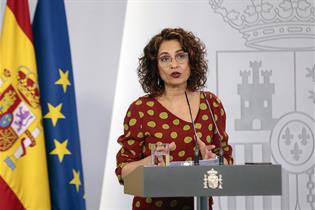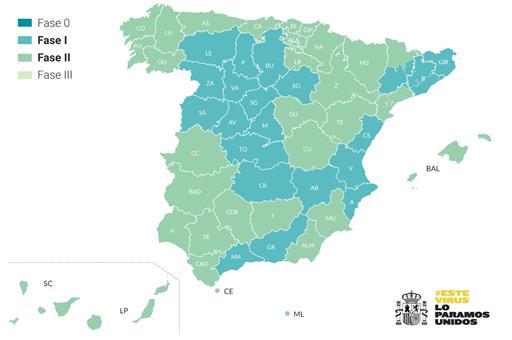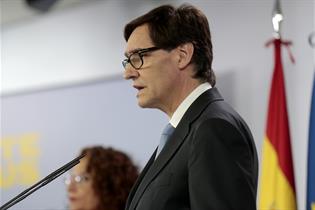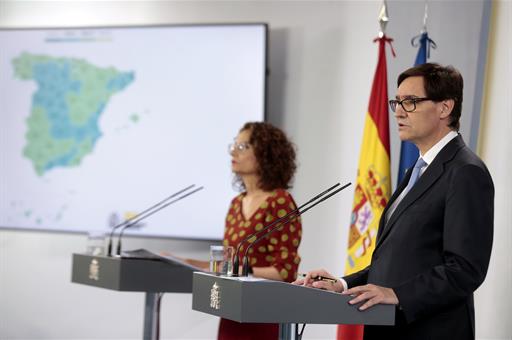Extraordinary Council of Ministers. Coronavirus COVID-19
Government to extend state of emergency to 7 June
Council of Ministers - 2020.5.22
Moncloa Palace, Madrid
The government has approved, after receiving authorisation from the Lower House of Parliament, the extension of the state of emergency, declared on 14 March to manage the health crisis stemming from the coronavirus, until midnight on 7 June.
The Minister for the Treasury and Government Spokesperson, María Jesús Montero, argued that this fifth extension is "essential to continue controlling the spread of the pandemic and making safe and prudent progress in an orderly and gradual de-escalation process". She also reiterated that limiting the public's movement is key to avoiding new infections, hospitalisations and deaths.
María Jesús Montero argued that the state of emergency "is not a political programme or a whim on the part of the government", but means we can save lives and protect the health of our people while science finds an effective treatment, a vaccine or a safe remedy to definitively combat the virus.
Dialogue with political forces
 Pool Moncloa/JM CuadradoMaría Jesús Montero stressed that the government will not shirk its responsibility or spare any effort to protect the health of the people, but called for all political forces to make a contribution. "This is a task that falls to all of us in a position of public responsibility".
Pool Moncloa/JM CuadradoMaría Jesús Montero stressed that the government will not shirk its responsibility or spare any effort to protect the health of the people, but called for all political forces to make a contribution. "This is a task that falls to all of us in a position of public responsibility".
The health, economic and social situation of Spain, argued the Government Spokesperson, cannot afford to be subject to vetoes and pre-established positions because the crisis demands new responses.
In this regard, she declared that the government has done what it had to do to push through the extension, which means talking and gaining the necessary support so that the extension of the state of emergency could be approved by the parliamentary groups in order to protect the health and safety of the Spanish people above and beyond any electoral questions or party politics.
"We will continue to seek support and alliances and outstretch our hand to everyone, offering institutional loyalty and dialogue to reach agreements with the different political groups, with institutions and with the social stakeholders", she stressed.
Health safety and social and economic reconstruction
María Jesús Montero added that these agreements must strengthen the health system, support companies, the self-employed, all workers and the most vulnerable families.
Along this line, she stated that the government has adopted extraordinary measures for the sum of 138 billion euros to protect the health and income of people, avoid jobs being shed and accompany the productive fabric through social dialogue.
The Government Spokesperson also highlighted that the European Commission backed the measures approved on Thursday by the government in recent weeks in response to the COVID-19 crisis. "All of the measures adopted in regard to the labour market have been negotiated, agreed and backed by the social stakeholders, and hence we want to stress that dialogue with the business organisations and trade unions is more important than ever".
María Jesús Montero stressed that the government intends to negotiate all the labour issues within the framework of social dialogue so as to create decent and safe jobs and more competitive companies.
De-escalation: all of Spain in Phases 1 or 2

The Minister for Health, Salvador Illa, announced that as from Monday, 25 May, Phase 0 of the De-escalation Plan will be behind us and all of Spain will at least be in Phase 1, while other territories will move into Phase 2.
Specially, all the provinces of Castile and Leon, the Region of Madrid and the health districts of the City of Barcelona, the Southern and the Northern Metropolitan areas of Catalonia will move into Phase 1. The Region of Valencia will remain in Phase 1, as it did not request to move into Phase 2, reported the minister. The health districts of Girona, Lleida and Central Catalonia in the region of Catalonia, the provinces of Malaga and Granada, in Andalusia, and the provinces of Toledo, Ciudad Real and Albacete, in Castile-La Mancha, will also remain in Phase 1.
The regions which will move into Phase 2 in their entirety are Aragon, Asturias, Cantabria, Extremadura, Galicia, La Rioja, Murcia, Navarre, and the Basque Country, together with the Autonomous Cities of Ceuta and Melilla. In the Balearic Islands and Canary Islands, the islands of Ibiza and Mallorca, and Gran Canaria, Lanzarote, Fuerteventura and La Palma, respectively, will also move into Phase 2, in addition to the islands of Formentera, La Gomera, La Graciosa and El Hierro, which were already there. In Andalusia, the provinces of Almeria, Cordoba, Cadiz, Huelva, Jaen and Seville will also move into Phase 2, as will the provinces of Guadalajara and Cuenca in Castile-La Mancha, and the health districts of Alt Pirineu i Aran, Camp de Tarragona and Terres de l'Ebre in Catalonia.
 Pool Moncloa/JM CuadradoIn summary, Castile and Leon, Madrid and the Region of Valencia are all in Phase 1 in their entirety, Andalusia, Catalonia and Castile-La Mancha will have some provinces or areas in Phase 1 and others in Phase 2, and the other 13 regions and autonomous cities will have all areas in Phase 2. This means that around 53% of the Spanish people, or 25 million people will be in Phase 1, and the rest, some 22 million people, will be in Phase 2.
Pool Moncloa/JM CuadradoIn summary, Castile and Leon, Madrid and the Region of Valencia are all in Phase 1 in their entirety, Andalusia, Catalonia and Castile-La Mancha will have some provinces or areas in Phase 1 and others in Phase 2, and the other 13 regions and autonomous cities will have all areas in Phase 2. This means that around 53% of the Spanish people, or 25 million people will be in Phase 1, and the rest, some 22 million people, will be in Phase 2.
The minister recalled that the decision to change phases in the de-escalation are taken in accordance with technical criteria set previously and at bilateral meetings held with the regional authorities, after their proposals have been analysed by the technical staff at the Health Alert and Emergency Coordination Centre and the professionals at the Directorate-General of Public Health.
Salvador Illa praised the "wonderful work" being done by the regional governments, which, he said, has not only helped us get out of this crisis situation, "but has also made us stronger".
Salvador Illa announced that as from Monday, the reports to justify the previous decisions to move to Phase 1 in all the autonomous regions will be made public, "in an exercise in transparency that has always been the aim of the Ministry of Health", he stressed.
As from Friday, measures to ease situation in small towns and villages in Phases 0 and 1
Salvador Illa recalled that as from Friday, following the publication of a ministerial order in the Official State Gazette, those villages with less than 10,001 inhabitants and a density of below 100 inhabitants per square kilometre that are in Phases 0 or 1, can enjoy some of the measures stipulated for Phase 2. This affects more than 7,300 towns and villages, 90% of all such municipalities, accounting for 10 million people, or 20% of the Spanish population.
These alleviation measures, explained the minister, basically include the removal of time slots for activities and the restriction on children under the age of 14 only being allowed out with an adult. "As from now, all those who live in the same family unit can go out together". In addition, open air markets are authorised to operate, as are street vendors, and the public may use the interiors of bars and restaurants.
"Each step, a safe step"
The Minister for Health praised the seriousness with which people are following the instructions and guidelines of the authorities and urged people to continue following them, since the de-escalation process is complex and difficult. The government, he said, continues to be guided "by the maxim of each step being a safe step.
For her part, María Jesús Montero called for commitment, discipline and responsibility from people in maintaining social distancing and complying with health recommendations, and sent out a message of prudence and caution. "We must continue taking steps in an intelligent and safe fashion to not render useless all the hard work and sacrifices made as a society".
Non official translation





